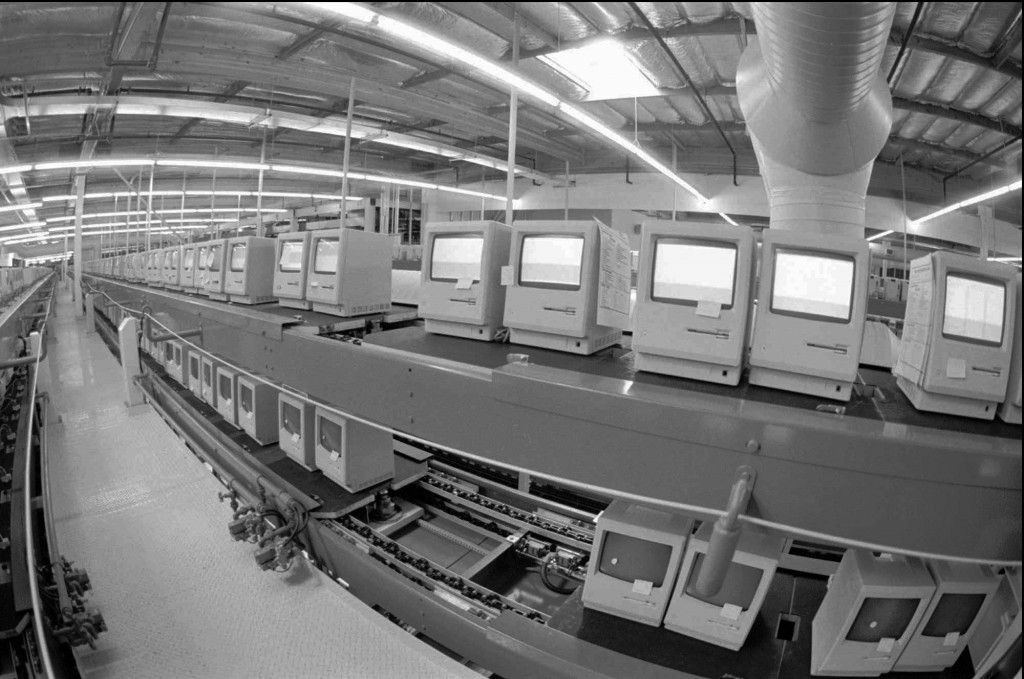Former Apple CEO Steve Jobs was, for a time, deadset on U.S.-based manufacturing of computers, an effort which collapsed after just eight years.
Steve Jobs had "deep convictions" about Japanese-style manufacturing, according to Randy Battat, who told the New York Times about his time as an electrical engineer at Apple and helping to launch early laptops. The company established U.S.-based Macintosh manufacturing in the early 1980s, beginning with a heavily automated factory in Fremont, Calif.
"The Japanese were heralded as wizards of manufacturing," Battat explained. "The idea was to create a factory with just-in-time delivery of zero-defect parts. It wasn't great for business."
In fact the result was "really shameful" and slipshod, said Jean-Louis Gassee, a French office automation specialist who became president of Apple's product division in 1988, well after Jobs' departure. He blamed the issue at least in part on overall deficiencies in U.S. infrastructure.
"We don't have a manufacturing culture," Gassee complained, "meaning the substrate, the schooling, the apprentices, the subcontractors."
President Donald Trump and others have urged companies like Apple to bring manufacturing back to the U.S. Decades of corporate offshoring have drained the country of its capabilities in that area however, and higher labor, safety, and environmental standards would likely increase Apple's expenses and already high pricetags. The company has nevertheless done some U.S. manufacturing in the post-Jobs era, namely building the cylindrical Mac Pro in a factory in Austin.
 Roger Fingas
Roger Fingas








 Christine McKee
Christine McKee
 Marko Zivkovic
Marko Zivkovic
 Mike Wuerthele
Mike Wuerthele

 Amber Neely
Amber Neely
 Sponsored Content
Sponsored Content
 Wesley Hilliard
Wesley Hilliard










39 Comments
I just don't see mass production of any Apple product coming to the US anytime soon. Tax deals aren't going to do it. We need to build and train our workforce too and I think it would cost way too much to build a fully automated assembly building today in the US and make it work accurately and efficiently at the same time. I know people hate that things like this are made in China but there's more to it than "Its just cheap labor".
My town is inundated with H1B-visa Indians who have replaced 50% or more of American IT personnel. About 35% of doctors are Indian on H1B visas. They have pushed Americans out of the jobs here, and these are not manufacturing jobs. These are high-tech and medical jobs. As a result, housing prices are through the roof. These temporary Indians are buying several houses each on interest-only loans, knowing full well that they are going to have to leave within 5-6 years and can simply abandon their houses (if the market turns down) with no consequences. Their monthly mortgage payments are significantly lower than apartment rentals because of the ARM-type loans that they take out. In the meantime, they are collecting rents on the multiple houses that they purchased with no credit history and no permanent status here. How can a temporary worker buy a house in the US on a mortgage is beyond comprehension. We have not learned anything from the 2009 housing crash.
If we don't want to manufacture anything, we don't want to build anything, we don't want to work in agriculture, we don't want to study sciences, we don't want to work as engineers, we don't want to be doctors, what the hell are we good for? Are we going to be pigs for the rest of the world to raise until we get fat enough to be slaughtered?
We can have robotic factories built in the US and train our citizens to maintain and program robots. If we don't know how to do this, let's invite Chinese, Japanese, and Germans to help us out, pay them handsomely, and learn how to make our own crap efficiently by leveraging the latest robotic technologies for manufacturing. This could not be done three decades ago, but with the advance of technology, it is now possible.
What data do you need? Other than Germany, most of the western countries (particularity the English speaking ones) are in the process of quitting, (have been since the 1970's) if Apple with 100's of billions being flushed down the buyout drain can't invest natively who will.